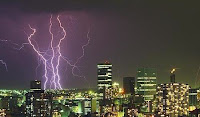Over the past few months, many hilarious questions have been asked by people who know very little about South Africa. We have decided to bring together our favourite gems and post them, so if you have a question you think may be a little silly or you would like a laugh, have a read and hopefully we can clear a few things up. Here it is - hilarious misconceptions about South Africa
1) We do not have fences that run around our cities to keep wild animals out. Wild animals are protected in reserves that are hundreds of kilometres big. We travel on holidays to go see them in their natural habitat, FAR away from cities. Visit Plettenberg Bay Game Reserve for more information and queries.
2) We do have electricity and running water. There are poor, often informal settlements, where water and electricity may not be provided. In all cities we have water and electricity. We also have internet and telephones and televisions and radios, and iPods and cellphones. For real.
3) South Africa is a country. It is right at the bottom of Africa. We have our own government and currency. We are a well developed country with well maintained tarred roads (We use cars to get places, not elephants). We have built up cities that are, more often than not, the power houses of Africa.
4) We can speak English. Speaking with "clicks" is a language that not every South Africa can speak. Xhosa is the most spoken language that makes use of clicks. So just clicking your tongue many times in different tones at a South African and asking them to translate will probably get you slapped in the face, or sworn at. It's annoying.
 5) We have many many different races and cultures in South Africa like most other cities in the world. We proudly call ourselves The Rainbow Nation because of this exact reason. So when you meet an Indian or white person or coloured or even a Chinese person from South Africa, do NOT ask why we are not black.
5) We have many many different races and cultures in South Africa like most other cities in the world. We proudly call ourselves The Rainbow Nation because of this exact reason. So when you meet an Indian or white person or coloured or even a Chinese person from South Africa, do NOT ask why we are not black.
6) We wear normal clothes. I have never and will never wear a loin cloth and go hunting.
 7) We do not have slaves.
7) We do not have slaves.
8) We live in houses, not underground or in huts.
9) We watch movies and listen to music, from the current year.
10) Yes there is poverty, no South African is going to deny this. But you aren't going to stay in a mud hut and eat goat intestines when you come to South Africa. Unless you want to.
11) It is not a jungle nor is it a desert. South Africa is very lucky because we have the majestic Tsitsikamma Forest along the Garden Route and we have the Karoo Desert that dries up a region in the south west part of South Africa. It is not extremely hot, we have temperatures that vary from 0 in winter to 40 in summer but most parts of SA are very varied. We even have snow in some parts of our country. We have cold and warm oceans either side and we have a great varied climate.
 12) We have toilets.
12) We have toilets.
13) Yes. It is true. We have the best rugby team in the world. (Rugby is a sport, Google it)
For information and specials on travelling to South Africa have a look at our site and our blog.
You can also Like us on Facebook and on Twitter @PlettGameRes for specials and great new information.














.jpg)






